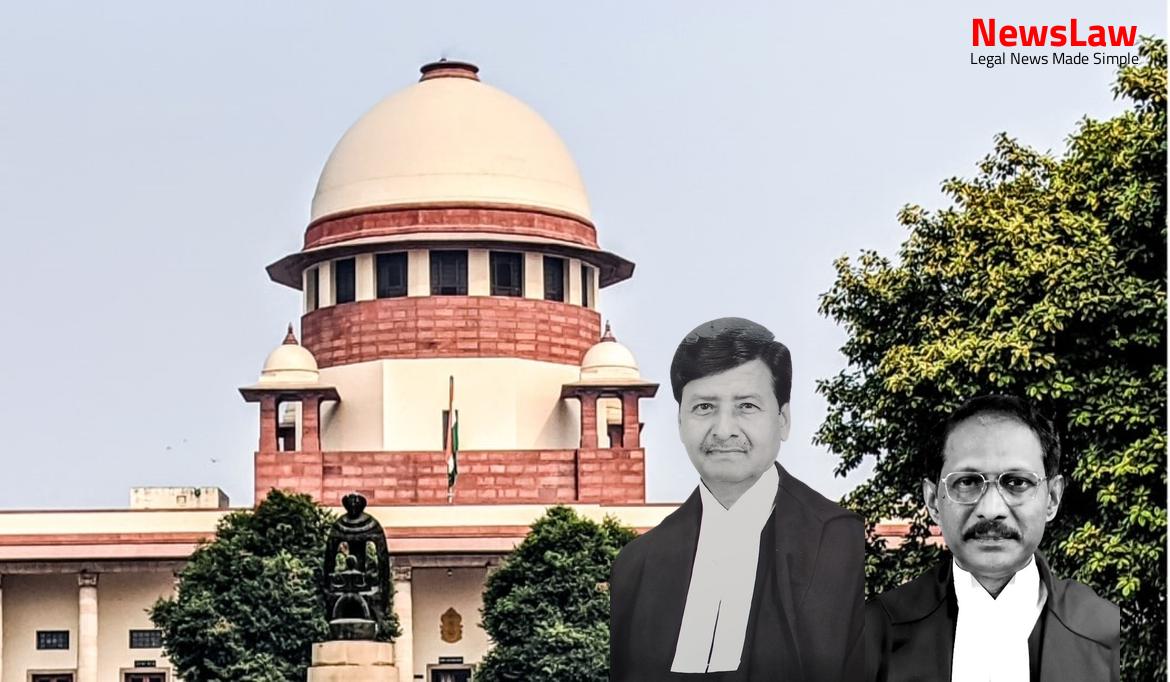In a landmark judgment by the Supreme Court of India, the case of Satyawati Sharma vs. Hereditary Tenant discusses the rights of landlords under the Delhi Rent Control Act. This ruling holds significance in determining the inheritance of statutory tenancy in commercial premises upon the death of a tenant. The judgment sheds light on the distinctions between residential and commercial tenancies, shaping the legal landscape for landlord-tenant relationships.
Facts
- The respondent-landlord filed an Eviction Petition on 03.01.2011 to obtain possession of the shop based on the son of the landlord needing the premises to start a business.
- The Rent Controller rejected the appellants’ application for impleadment in the case.
- The tenant filed a cross-objection which was allowed.
- A writ petition was filed in the High Court for authoritative interpretation of certain sections of the Act.
- The High Court dismissed the writ petition stating alternative remedies should be exhausted first.
- The widow of a deceased tenant filed an appeal, and the landlord filed a cross-objection mentioning plans for property modifications.
- The tenant filed an application seeking leave to defend, which was noted by the Court.
- Various grounds were raised in support of the appeal in C.A.No.3793 of 2016.
- The Additional Rent Controller rejected the appellant’s application seeking leave to defend, leading to a revision petition being filed under Section 25-B(8) of the Delhi Rent Control Act, 1958.
- The Rent Controller allowed the landlord’s petition based on default in rent payment, rejecting other grounds.
- A Special Leave Petition against the High Court’s judgment and a writ petition was filed in this Court.
- The High Court dismissed the revision petition filed by the appellant on 14.03.2016.
- The other accused were tried in a regular Sessions Court and found guilty of offences under Section 376(2)(g) and Section 302 of the Penal Code.
Also Read: Dispensation with Personal Appearance in Criminal Case: Landmark Judgement by Supreme Court of India
Issue
- The issue in question is whether the heirs of a deceased tenant, whose contractual tenancy for commercial premises has ended, are entitled to the same protection against eviction provided by the Delhi Rent Control Act.
- The main point of consideration is whether the statutory tenancy for commercial premises under the Act is inheritable or not.
- This appeal seeks to determine whether under the Delhi Rent Control Act of 1958, statutory tenancy in commercial premises can be passed on to heirs upon the death of the tenant.
Also Read: Case of Unnatural Death in Matrimonial Home: Supreme Court Judgment
Arguments
- The two-Judge Bench in Satyawati Sharma has re-written Section 14(1)(e) which is deemed as exceeding the judicial authority and should have been left for the legislature.
- The distinction between residential and commercial premises in Delhi has been acknowledged in the Constitution Bench in Gian Devi Anand.
- The argument that the judgment of Satyawati Sharma should be referred to a larger Bench lacks substantial grounds.
- The application under 14(1)(e) was initially intended only for residential premises according to the Act.
- The judgment in Satyawati Sharma was found to be erroneous in considering that Rent Control legislation did not differentiate between residential and non-residential purposes.
- The validity of Section 14(1)(e) was challenged in the Delhi High Court but the challenge was rejected multiple times.
- There are concerns regarding the rejection of leave to defend under Section 25B and the hardship it causes tenants, especially regarding non-residential premises.
- The judgment of Satyawati Sharma was based on legislative intendment and should not have deviated from the original purpose of the provision.
- The judgment is considered to be per incuriam as it did not follow the binding Constitution Bench judgment in Gian Devi Anand and ignored relevant provisions of the Act.
- Various grounds were presented to question the correctness of the Satyawati Sharma judgment, emphasizing the need to revisit it.
- The Court’s findings should be in alignment with the legislative intent, and in this case, the legislative intent did not support the application of 14(1)(e) to commercial premises.
- Learned counsel for the parties focused on whether the judgment in Satyawati Sharma requires reference to a larger Bench.
- Counsel for the appellant argued that the case of Super Max dealt with a different subject and did not affirm the ratio of Satyawati Sharma.
Also Read: The Jodha Ram vs. Kaushaliya Dispute: Supreme Court Judgement Summary
Analysis
- The judgment of Satyawati Sharma stands the test of time and cannot be revived.
- The observation in Gian Devi Anand’s case suggests that a ground for eviction of a tenant of commercial premises on the bona fide requirement of the landlord should be provided for.
- The basis for striking down Section 14(1)(e) in Satyawati Sharma was clearly laid down in Gian Devi Anand’s case.
- Commercial tenancies have distinct features and characteristics different from residential tenancies.
- The judgment of Satyawati Sharma cannot be termed per incuriam as it has been considered in line with the legislative and constitutional requirements.
- The legislative intent was clear based on the provisions and context of the Act.
- The Legislature may need to consider the advisability of making the bona fide requirement of the landlord a ground for eviction in respect of commercial premises as well.
- The observations in the judgment of Satyawati Sharma were not obiter but judicial dicta reaffirming principles.
- The Delhi Rent Control Act, 1958 regulates rents, repairs, maintenance, and evictions in Delhi.
- Premises are defined as a building or part intended for residence, commercial use, or other purposes.
- Chapter III deals with the control of eviction of tenants.
- Section 14(1) lists various grounds for eviction by the landlord.
- Certain grounds are specific to residential premises, offering protection to tenants.
- Section 14(1)(e) allows recovery of possession for residential premises required for landlord’s or family member’s occupation.
- Section 22(r) allows recovery of possession for residential or non-residential premises needed for landlord’s or family member’s occupation.
- The concept of per incuriam is utilized to save a statute from being struck down due to its unconstitutionality.
- Per incuriam refers to a judgment rendered by ignoring provisions of the governing statute and earlier larger Bench decisions.
- Reading down provisions of a statute is not applicable if the meaning is clear and the legislative intent is evident.
- Laws can become arbitrary and unreasonable with time and changing circumstances.
- Section 2(1)(iii) of the Act restricts the rights of heirs of a statutory tenant in residential premises.
- Section 14(1)(e) allows eviction based on bona fide requirement of the landlord for residential premises.
- There is unjust classification between residential and non-residential premises concerning the landlord’s right of eviction.
- Legislation that was reasonable upon enactment can become unreasonable and violative of equality with time.
- The judgment in Satyawati Sharma struck down the discriminatory portion of Section 14(1)(e) to ensure equality.
- Judgments cited include Harbilas Rai Bansal and Rakesh Vij which emphasize no distinction in eviction grounds for residential and non-residential tenancies.
- Satyawati Sharma does not need to be referred to a larger Bench for reconsideration.
- This submission by the appellant’s counsel has been rejected.
Decision
- The Court considered the arguments presented by both parties in regards to the RPC
- The Court analyzed the relevant case laws and statutes applicable to the RPC
- The Court provided a detailed explanation of the legal principles involved in the RPC
- The Court examined any previous judgments that could be relevant to the RPC
- The Court made a specific ruling or decision on the RPC based on their analysis
Case Title: VINOD KUMAR Vs. ASHOK KUMAR GANDHI
Case Number: C.A. No.-003793-003793 / 2016



